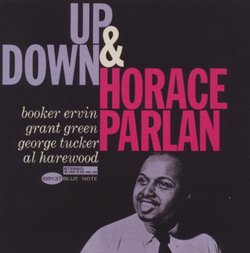Everything's Up on "Up & Down"
Michael B. Richman | Portland, Maine USA | 02/12/2009
(5 out of 5 stars)
"Horace Parlan's "Up & Down" is a most welcome addition to the RVG Series. Over the past twenty years, only three of Parlan's seven Blue Note albums were even issued in the States, with all of them currently out of print. (Thankfully they were all collected on a Mosaic set.) As a result, you may not have any CDs by Horace Parlan as a leader, but you might be surprised by the sessions he appeared on as a sideman. In the late 1950s, Parlan was a mainstay in the band of Charles Mingus, appearing on the classic Atlantic album "Blues & Roots" and Columbia's "Mingus Ah Um." On Blue Note, the great rhythm trio of Parlan, bassist George Tucker and drummer Al Harewood was the foundation for many classic dates of the early 1960s -- Dexter Gordon's Doin' Allright, Lou Donaldson's "Midnight Sun" and several Stanley Turrentine recordings, including Look Out, "Comin' Your Way" and "Up At Minton's." This June 18, 1961 session, Parlan's sixth for the label, added tenor saxophonist Booker Ervin and guitarist Grant Green to that trio to great effect. On "Up & Down," the pianist continues to showcase the funky hard bop grooves of earlier efforts, but the solos stretch out here in a more modern direction, led by the contributions of Ervin and Green. Look no further than Ervin's solo on "The Book's Beat" or Green and Parlan's solos on the blues "The Other Part of Town" as examples, though my favorite track has to be the forward thinking "Fugee." You can see why when Parlan returned one final time to the studio for Blue Note in 1963 (for the session known both as "Happy Frame of Mind" and "Back to the Gig"), the only players he brought back were Ervin and Green. It's too bad these three weren't able to cut as many dates as the Turrentine/Parlan groups were, but that's the "Up & Down" of the jazz life -- at least we've got this one to enjoy!"
Parlan's parlance
Douglas Parham | Mojave desert | 03/23/2009
(3 out of 5 stars)
"Horace Parlan came to my attention on several of Roland Kirk's albums where his quirky, futuristic, individualized style defined the rythm section for Kirk.
Nevertheless, on "Up and Down" Parlan's playing is uneven, forced and boring. I am referring to his solos only. The arrangements and ensemble playing are great and behind Grant Green and Booker Little, he makes the rhythm section sizzle.
His solos do feature his signature rising-diminished-chord riff that is so definitive of his work with Kirk, but absent are the many quotes from show tunes that I came to identify him with. Instead we get forced, bluesy riffs repeated ad nauseum. I say forced because they depart so dramatically from the elegant bop lines played by Green and Little.
I heard Parlan on Stanley Turrentine's "Up at Minton's" where he murdered "Love for Sale" in a similar manner, seemingly unprepared for the piano solo and throwing out unrelated groups of notes just to fill up space.
Parlan's more recent work recorded in Denmark show a lyrical, canny sense of melodic play which focus on the use of space not present on this album.
Parlan's presence on Kirk's "I talk with the Spirits" and "Slightly Latin" show him in a much more favorable light. His work there is exciting and stylistically definitive of the post=bop piano texture."
Solid, Not What I Expected
Gerrit R. Hatcher | 02/19/2010
(4 out of 5 stars)
"This an enjoyable album, skirting that common early-60's Blue Note line between Hard-Bop and Soul-Jazz, the album in this context is well paced and without noticeable flaws. If you look even a tiny bit deeper this album takes a lot of powerful and energetic parts and assembles a machine of far less power. Booker Ervin and Parlan had just played on some of Mingus' most explosive dates, and contributed soulfully, leaving there marks all over Blues and Roots and Mingus Ah Um. It just does not reach that level here, and I don't think Mingus is the missing ingredient. Later this decade Booker would burst with energy on a series of records on Prestige, and play on more great Mingus dates. Parlan would go on to play with even more explosive saxophonists such as Archie Shepp and Roland Kirk. Grant Green was just getting his start in 1961, so he does not have the confidence of style he would on later dates, which some could call formulaic. On Lou Donaldson's Here Tis', and other records with Babyface Willette from this year this greeness (pardon the pun) would contribute to the driving bluesy strivings of someone with something to prove. Here when his repetitious lines (I mean this positively, it's part of his style) get cooking, the ensemble fails to raise the temperature to soul jazz levels, where Green clearly wants to be.
This is an album I hoped, considering the personnel, would explode with energy and the vestiges of Mingus found on Jaki Byard, Jackie Mclean, and Booker Ervin records of this era, instead it is a fairly typical early sixties hard-bop affair, with NO chances taken. Solos are good, relaxed, and jam-esque, but many of the same licks come up across multiple tracks. All this said, this record succeeds at being what it is on all fronts. The playing, pacing, and program choice are flawless, and you will come back to tracks like The Book's Beat and Fugee more than a few times, but there are no real fireworks going off here."


 Track Listings (7) - Disc #1
Track Listings (7) - Disc #1